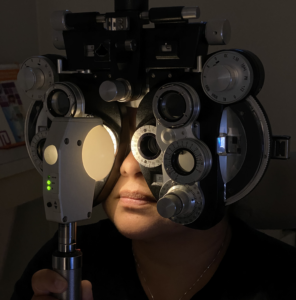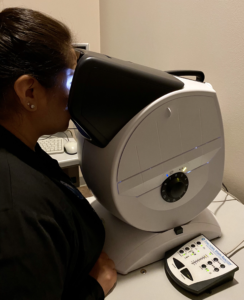Cataract Evaluation
We may recommend a cataract evaluation around age 60, if you have a history of diabetes, a history of steroid prescriptions, or based on your symptoms. Symptoms of cataracts can vary, but many patients tend to experience problems with night driving, decreased contrast, and glare. Cataract evaluations entail a refraction to determine the best corrected visual acuity and a brightness acuity (glare) test. Based on the results of the glare test, we may also conduct a contrast test with and without glare. The results of these tests, in addition to Dr. Planchard’s examination of your dilated eyes, will determine whether or not cataract surgery is recommended for you.

Brightness Acuity Test (Glare) – Provides objective measurements of visual acuity under three different lighting conditions. Helps to determine the severity of intraocular light scatter (glare) from cataracts.

Functional Acuity Contrast Test – Cataracts can cause decreased contrast sensitivity and this test helps to quantify just how much loss there is which helps indicate if cataract surgery is warranted.
If Cataract surgery is not recommended, it means your cataracts are not impairing your vision enough to warrant surgery at this time. Dr. Planchard may recommend repeating the evaluation in six months or a year to reassess your vision then.
If cataract surgery is recommended, we’ll schedule a preoperative appointment along with the surgery dates. This preoperative appointment can be a lengthy one, as we’ll be obtaining several diagnostic measurements and tests of your eyes to determine the most appropriate artificial intraocular lens to implant.






